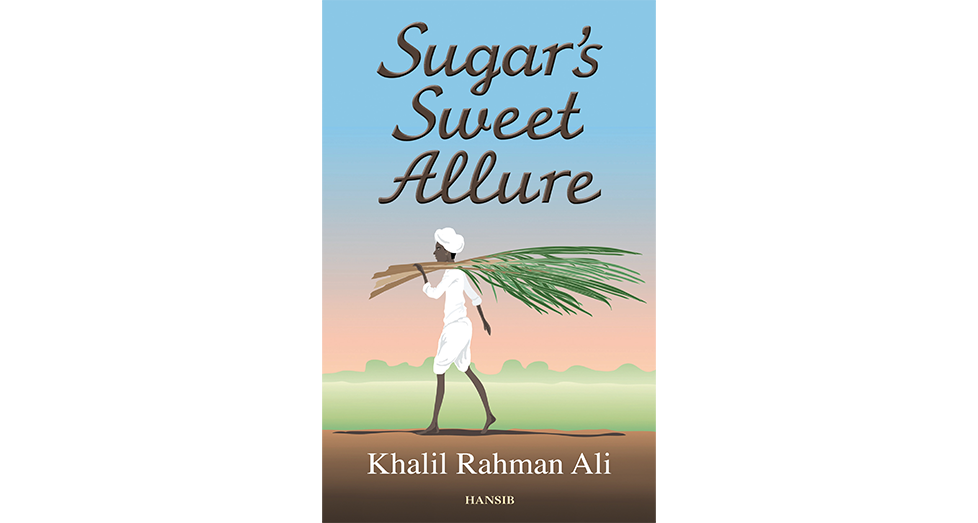A Short Story from Sugar’s Sweet Allure by Khalil Rahman Ali
Mustafa Ali was perspiring profusely as he waited impatiently for Chandini Sharma, the love of his life. Their Muslim and Hindu liaison was strictly forbidden by almost everyone in their village. He crouched low behind some sage bushes just outside the six-foot-high brick walls surrounding the compound of her family home. It was about eight o’clock in the evening, and the only visible source of light was the bright full moon. The temperature was unusually cool for January 1843, in the State of Uttar Pradesh in Northern India.
“Chandini… Chandini, are you there?” he whispered above the din made by hundreds of crickets and mosquitoes. He was very wary of being heard by Ballu, the watchman and guard of Chandini’s family home and compound. Mustafa kept as still as possible and decided to wait a little longer so as not to arouse any suspicion in Ballu or his guard dog, which was fast asleep. The mongrel was tied securely to a short wooden peg in the hard ground by the main gate.

Ballu was never the most vigilant or alert of watchmen, and was known to drift off into sweet slumber through the night whilst on duty. No one from the large household ever seemed to check on him or his equally lazy canine companion. This approach to security by Ballu, a short and chubby man in his late forties, allowed Chandini—sixteen years old, the youngest child of the Birendra Sharma family—to sneak past him and out of the compound to meet her Mustafa, who was eighteen.
This night was crucial for the two young lovers as they wanted to meet one last time to plan their elopement. They would creep slowly through the sage bushes beside a pathway, as they had done many times over the last few months. The pathway led to the edge of a great stream that flowed past their beautiful, serene village near the town of Kanpur. They would nervously hold hands, tiptoe down to the water’s edge, and sit on one of the ghats with their feet dangling into the cool, soothing water as it slowly and silently ebbed along. A great mango tree’s branches provided cover over the ghat in the evenings, and welcome shade during the bright, hot, and sunny daytimes.
Mustafa was about five feet nine inches tall, of dark brown complexion, and appeared older than his age due to his work as a labourer in the village and local sugarcane plantations. Chandini was petite, about five feet tall, fair, and always wore a captivating smile which exuded a sense of mystique. Their relationship had begun as innocent children playing amongst others in the village square. However, as they grew older, their friendship was frowned upon—particularly by the village elders and their families.
Their clandestine meetings were normally restricted to about half an hour to an hour at most, for fear of being discovered, particularly by anyone from Chandini’s family or the household servants, including Ballu. They would hold hands and whisper about how much they felt for each other—about the first time they looked at one another and realised that the little glances they exchanged meant more than friendly acknowledgement and mutual respect.
Mustafa was the youngest of Hussein Ali’s seven children, all of whom worked on the sugar plantation owned by Birendra Sharma—Chandini’s father and the Zamindar of the village. The work in the sugarcane fields was tough and included cutting grass and weeds from the undergrowth while the young sugarcane plants grew to maturity. The grass and weeds were manually cut using a hand-held “grass knife”, a sharpened and jagged half-moon-shaped iron blade wedged into a wooden handle. A two-foot-long machete or “cutlass” was used to cut the sugarcane stalks about six inches from the base. The cut stalks were tied into bundles using the long grass-like leaves of the plant and packed onto two-wheeled bullock carts for processing into sugar.
Mustafa always took great pride in carrying his grass knife securely tied to his hip with a string tightened around his waist. He had learnt the art of weeding from one of his most experienced brothers.
The village was a small enclave of two-roomed, low-level wooden houses spread out in a loose circle away from the square. A large banyan tree provided natural shade in the middle of the square. Wooden seating was constructed around the base of the tree, where the village elders would normally sit discussing all manner of issues affecting village life. This was also the central meeting point for villagers, where the Zamindar and other prominent members of the community would gather to hold meetings, hear disputes, and deliver judgements on family matters.
Some of the elders held sessions of storytelling which fascinated the children and young people. The youngest used the square as their main playground, chasing each other tirelessly, only to be scolded when the noise became too distracting. Mustafa and Chandini, when very young, often joined in the play and listened to the stories told just after sunset.
The Sharma’s house was the most substantial property in the village, with two floors. There were four bedrooms on the upper floor, and the flat roof was often used as a place for sleeping during the dry, cool summer evenings. The majority of the three hundred villagers were Hindu, who lived in low-level houses about a hundred yards from the square and the Sharma residence. The minority Muslims lived in a few similar houses a little further behind. The Sharma’s house was flanked on either side by a large Mandir and a Mosque.
Hussein Ali’s family were Muslims who tried their best to practise their faith, learning to read the Holy Qur’an in Arabic and observing namaaz five times each day, even while working in the sugarcane fields. They fasted through the holy month of Ramadan and gave zakaat to the poor, whether or not they were Muslim. Those who could afford it undertook pilgrimage to Mecca at least once in their lifetime.
Birendra Sharma was a Hindu of the Brahmin caste who, though not as learned as a Pandit, ensured his family followed the tenets of Sanatan Dharm and obtained knowledge through study of the sacred Hindu texts such as the Vedas, Ramayan, and Bhagwad Gita. The family also served the community selflessly. Indivar, the eldest at twenty-two, was being groomed as his father’s successor while studying to become a Pandit.
The Sharma family funded the village’s only Mandir, built mostly during the gap between harvests. Everyone with a skill—stone and wood carving, carpentry, masonry, roofing—was contracted to work on the building and its grounds. The Ali family also helped to build the Mandir. Likewise, when Hussein Ali’s grandfather started building the first and only Mosque in the village, everyone, including the majority Hindus, helped.
The Madrasa built alongside the Mosque taught young Muslim boys and girls Arabic and Urdu and the tenets of Islam. The Mandir also served as a school where young Hindu children learnt Hindi, Sanskrit prayers, and Indian classical music, singing and dancing. Everyone in the village communicated in Bhojpuri, and some had begun learning English through contact with the British, whose influence was expanding across Uttar Pradesh, Bihar, and Bengal.
Both Birendra Sharma and Hussein Ali were mutually respectful and shared a common dislike for the new masters—the latest in a long line of invaders to their beloved country. Their families collaborated to resist the British as their ancestors had done against the Marathas and the Mughals.
In one such battle against the Marathas, their fathers—close friends—fought side by side. Hussein Ali’s father, gravely wounded while protecting his friend, begged Allah for mercy and his friend to look after his family. This final pact between them included a promise that their families would continue following their respective faiths and never intermarry. The Ali family would also honour their debts to the Sharmas by working on the sugar plantation.
This mutual respect continued with Birendra and Hussein often meeting at each other’s homes to discuss village matters and the growing influence of the British.
On one such occasion, Birendra visited Hussein’s home. Hussein’s wife, Batool, silently served hot green chai brewed over a clay stove before sitting in the courtyard to sift rice. Mustafa stayed in the adjacent room, listening.
“Hussein bhaiya, I need to talk to you about your youngest son Mustafa,” Birendra began.
“What has he been up to now?” asked Hussein, looking perturbed.
“I have heard that he has been secretly meeting my daughter Chandini. And I am worried that the two of them have strong feelings for each other.”
Hussein put his cup down slowly, surprised. “This is the first I’m hearing of this,” he said. “Have you scolded Chandini?”
Birendra shook his head. “I wanted to speak with you first, so we can decide how to deal with it together.”
They both remembered their families’ pact—marriage between their children was unthinkable.
“Maybe you can talk to Mustafa and confirm what’s going on,” Birendra continued. “Also, please don’t tell anyone, especially your sweet daughter Aleemah. She’s been passing messages between them when she comes to work at my house.”
Aleemah, nineteen, was close to her best friend Chandini and always advising Mustafa. Smart and inquisitive, she knew her family’s obligation to serve the Sharmas and secretly wished for freedom. “Like the meaning of your name,” she once told Mustafa, “you’re the Chosen One to liberate the family.”
“How did you find out?” asked Hussein quietly.
Birendra leaned forward. “I overheard Aleemah making plans with Chandini for her meeting with Mustafa by the ghat beside the mango tree near the stream.”
Mustafa, listening, caught his sister’s name and realised she should no longer be involved.
“If it’s true, I’ll tell Mustafa to stop seeing her immediately,” Hussein said. “He’s of age to marry, and perhaps you can help find him a suitable girl.”
“Thank you, Hussein bhaiya,” Birendra replied. “I’ll ask Ballu to be watchful and make sure none of my family, especially Mahaveer, find out.”
They concluded their meeting warmly. Birendra left, greeting Batool respectfully on his way out.
Mustafa, hidden from sight, sat quietly in thought. He knew the strict separation between their religions and that their relationship was forbidden. Any couple who crossed that line faced harsh punishment. His and Chandini’s love could mean ruin—for both their families.












